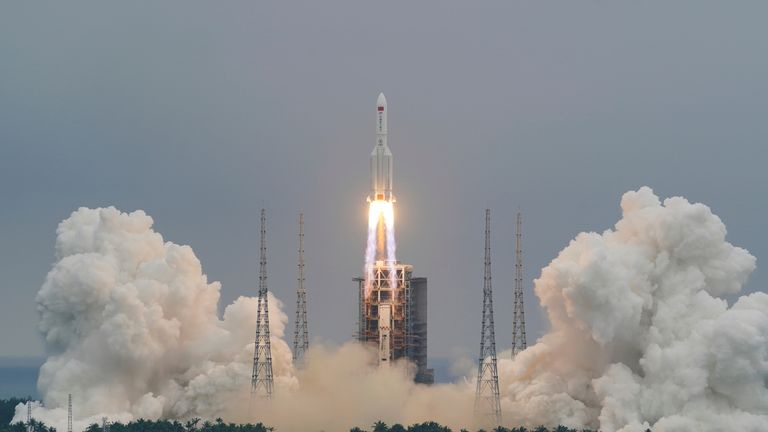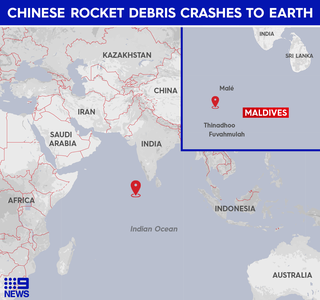Out Of Control Chinese Rocket Crashes In Indian Ocean Near Maldives

A large Chinese rocket that was orbiting earth out of control has finally made impact, landing in Indian Ocean close to Maldives, drawing sharp criticism from US National Aeronautics and Space Administration (NASA).
According to China Manned Space Engineering Office, the rocket made impact about 3:24am Nigerian time on Sunday, roughly two hours earlier than predicted.

The Long March 5B rocket, which was around 30 metres tall and weighed 20 tonnes, tumbled through space in an uncontrolled orbit at 30,000 kilometres per hour.
It was more than 10-story building, and weighed roughly the same as a full garbage truck, causing many to raise concerns about the impact its landing could have had.
The rocket was originally launched in late April to carry the first part of China’s Tianhe module, which will serve as the core of its planned crewed space station.
However, the rocket booster itself went into orbit, and began an uncontrolled re-entry into earth that led to fears it could crash in a populated area, harming several people:
Despite fears that the arrival of the rocket could endanger people on the ground, experts cautioned that a re-entry over water was most likely, simply because it makes up three-quarters of the surface of the Earth, adding the chances of actually being hit by any piece of the rocket were miniscule.
The rocket made its re-entry just west of Maldives, according to Chinese officials posting on Weibo, Chinese-whatsapp social media.
Most of the debris was destroyed during the re-entry, and those remains fell into the ocean, the post said, though it gave no indication of how it had gathered that information.
It had been difficult to predict where or when the spacecraft might fall back down to Earth because of an array of unknown details, both about the rocket itself but also the way that the atmosphere would act on it.
Scientists during the week predicted that there was a tiny chance the debris could hit New York, Los Angeles, Madrid, Rio de Janeiro, Nigerian capital of Abuja or Beijing.
However, Space-Track, which had been publishing official data from the US Space Force, in a tweet said people tracking the rocket “can relax”. “The rocket is down,” it wrote.
@18SPCS confirms that CZ-5B (#LongMarch5B) (48275 / 2021-035B) reentered atmosphere 9 May at 0214Z and fell into the Indian ocean north of the Maldives at lat 22.2, long 50.0. That’s all we have on this re-entry; thanks for the wild ride and 30K more followers. Good night!
— Space-Track (@SpaceTrackOrg) May 9, 2021
Given the fact the rocket appears to have re-entered above the ocean, there may also be no eyewitnesses or video footage of the rocket’s arrival.
The Long March 5B rocket is one of the biggest pieces of space debris to return to Earth. China launched another version of the rocket, almost exactly a year ago, which crashed into houses in Ivory Coast when it came back down to Earth in a similar uncontrolled re-entry.
Following the return of the rocket today, NASA Administrator, Bill Nelson criticised China over the re-entry, saying spacefaring nations needed to minimise risk and maximise transparency in such situations.
Nelson in a statement said;
It is clear that China is failing to meet responsible standards regarding their space debris. It is critical that China and all spacefaring nations and commercial entities act responsibly and transparently in space to ensure the safety, stability, security, and long-term sustainability of outer space activities.
Despite recent efforts to better regulate and mitigate space debris, Earth’s orbit is littered with hundreds of thousands of pieces of uncontrolled junk, most of which are smaller than 10 centimetres.
Objects are constantly falling out of orbit, though most of them burn up in the Earth’s atmosphere before they have a chance to make an impact on the surface.
